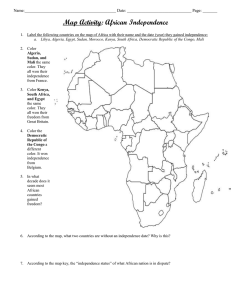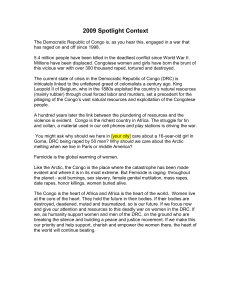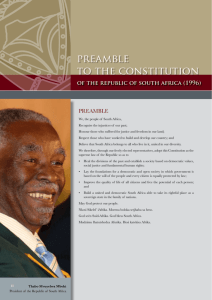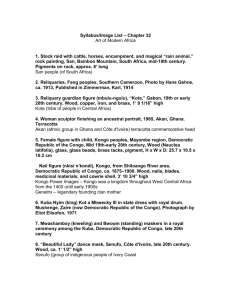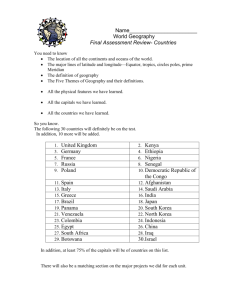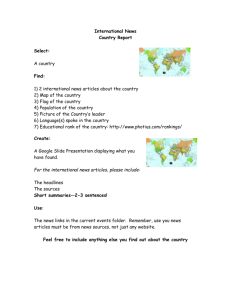Democratic Republic of Congo (DRC) By: Carly Farmer and Riya Trasi
advertisement
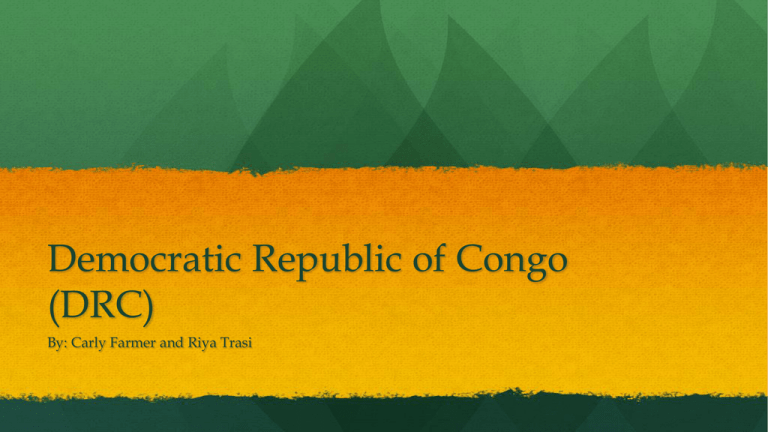
Democratic Republic of Congo (DRC) By: Carly Farmer and Riya Trasi Geography/ location Democratic Republic of Congo is located in central Africa. In 1996, DRC had a population of about 43,424,997 people. Background DRC has experienced two wars since 1996: The first was a direct result of the Rwandan genocide in 1996 The second was a civil war that resulted in the involvement of DRC’s, along with seven other countries’, militia. Current problems Lord’s Resistance Army Rebel group that is infamous for their kidnapping and raping of women Les Effaceurs (“the erasers”) Rebel group that wants to clear people out of their land for mineral exploitation Cause/Conflict Since 1998, about 5.4 million people have died from disease – half of which are children under the age of 5 – caused by: Destroyed healthcare system Displacement Lack of food security Collapse of infrastructure People/Sides involved FDLR – Democratic Forces for the Liberation of Rwanda Was a peacekeeping group but became rebellious MONUC Peacekeeping groups backed by UN Rebel groups against the civilian population At times each organization has gotten governmental support from bordering nations Children and women are the main victims of violence in DRC Children are taken to be child slaves/soldier Women are forced into prostitution Dates First War = 1996 – 1997 Second War = 1998 – 2003 July 2006 – first election in almost 40 years; Joseph Kabila came into power He brought the hope of a peaceful resolution to the nation, but it was hard because of the lack of stability (both economically and politically) Resolution June 23, 2004 – International Criminal Court (ICC) declares an official investigation into the problems in DRC March 2006 – Thomas Lubanga officially arrested by ICC for multiple counts of recruiting child soldiers during the Second War March 14, 2012 – Thomas Lubanga’s case reached a guilty verdict Controversial “Resolution” The issues in Congo, however improved, are not completely resolved: The lack of economic stability in the country still kills millions from disease, malnutrition, etc. Rebel groups are still attacking innocent civilians Pledge Everyone acknowledges how the dark parts of history must never be repeated, but nobody ever takes action. We pledge to both acknowledge and take action towards finding a resolution. Support 2010 – UN released a report on human rights violations in DRC Outlined the most serious violations of human rights and international humanitarian law Offered a range of options to deal with the legacy of the crimes Currently there are 20,000 UN peacekeepers in DRC It’s the largest and most expensive UN mission Works cited "Democratic Republic Of The Congo." Democratic Republic of the Congo Map / Geography of Democratic Republic of the Congo / Map of Democratic Republic of the Congo. WorldAtlas. Web. 01 Feb. 2016. "Democratic Republic of Congo." United States Holocaust Memorial Museum. United States Holocaust Memorial Council. Web. 01 Feb. 2016. "Democratic Republic of the Congo « World Without Genocide - Working to Create a World Without Genocide." Democratic Republic of the Congo « World Without Genocide - Working to Create a World Without Genocide. World Without Genocide. Web. 03 Feb. 2016. "Flag of Democratic Republic of Congo." Flag of Democratic Republic of Congo. Maps of World. Web. 01 Feb. 2016. "Nutrition Clinics Offer Hope in the Midst of a Drought." Nutrition Clinics Offer Hope in the Midst of a Drought - IRFC. IRFC, 12 Sept. 2012. Web. 03 Feb. 2016. "Population, Total." Total Population Data. The World Bank, 1 Jan. 1997. Web. 01 Feb. 2016. "Q&A: DR Congo Conflict - BBC News." Q&A: DR Congo Conflict. BBC News, 20 Nov. 2012. Web. 03 Feb. 2016. Shah, Anup. "The Democratic Republic of Congo." Global Issues. Global Issues, 21 Aug. 2010. Web. 01 Feb. 2016. "UNICEF Photo Essay - Child Poverty in the Republic of Congo." UNICEF Photo Essay - Child Poverty in the Republic of Congo. UNICEF. Web. 03 Feb. 2016.
